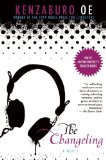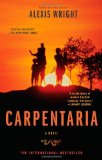Summary | Excerpt | Reviews | Beyond the book | Read-Alikes | Genres & Themes | Author Bio

A Novel
by Cees NooteboomA brief, sweet book, rich with dreaming and gentle
philosophizing, Lost Paradise is best read at a leisurely clip all in one
afternoon. To split its 150 pages (with generous margins and small trim size)
would be to lose the thread – a remarkably gossamer thread – that could easily
be broken by a day of work or night of sleep. Placing trust in ideas and
ruminations, Cees Nooteboom does away with the trappings of traceable plot lines
and solid characters until the very end, when the myopic lens through which
we've been peering clicks into focus and reveals the tableau that we've been
squinting at all along.
What seems at first like a writer being bossed about by his
characters, and in the process getting bogged down by their exclusive
meditations, becomes an often beautiful show, in which the puppet is revealed to
be holding the strings, and proves deft and charming in both roles. Murky
Aboriginal concepts of The Dreamtime (see sidebar) meld with Botticelli's
The
Annunciation and references, of course, to Milton's
Paradise Lost.
The chapters are brief and fleeting, their sequence disorienting. The author
himself appears in the first and last few pages, book-ending the story with the
self-conscious musings of a curious observer and compulsive storyteller,
revealing what might be the crux of the entire novel.
As much an experiment with the form and purpose of the novel as
a lovely aesthetic endeavor, Lost Paradise could be read so many
different ways by so many different readers -- and perhaps by the same reader on
different days. Is it a writer's exercise, exploring the role of the author in
his own work, his inspirations, and his quest to connect? Is it a challenge to
the reader to drop his or her craving for "knowing" or "getting it", and to
experience the novel in a purely aesthetic and philosophic form, free from
conventional expectations? Is it really about how the divine touches our lives,
as the jacket says, or is it more about how we seek hard enough for the divine
to conjure its form ourselves?
Whether those questions will be worth pondering, or even whether
Lost Paradise is worth reading to find the answers is ultimately an
intensely personal question. No doubt it will be divisive, declared alternately
a masterpiece, masterful, and a real "piece of work" by critics and readers of
all stripes. Some of us don't like to work quite so hard to get to the bottom of
things, while others find greatest pleasure in the challenge. Still others won't
care about dissecting and distilling, choosing instead to read this slip of a
novel for its dreamy, grainy-film-like qualities, suspended in time and just
outside of the concrete world.
About the Author
Born Cornelis Johannes Jacobus Maria Nooteboom in The Hague in 1933, essayist,
poet and novelist Cees Nooteboom (pronounced sace, rhymes with face, note-boom) is one of Holland's most renowned authors. He has won the Pegasus Prize, the Constantijn Huygens Prize, the Aristeon European Literary Prize, and has been frequently mentioned as a candidate for the Nobel
Prize. Although first published in 1955, none of his work was translated into
English until 1983. Lost Paradise is his ninth novel to be
translated into English (partial bibliography at
BookBrowse).
![]() This review was originally published in The BookBrowse Review in November 2007, and has been updated for the
November 2008 edition.
Click here to go to this issue.
This review was originally published in The BookBrowse Review in November 2007, and has been updated for the
November 2008 edition.
Click here to go to this issue.

If you liked Lost Paradise, try these:

by Kenzaburo Oe
Published 2011
The Changeling, the latest from Kenzaburo Oe, is an ambitious, sweeping novel about friendships, artistic ambitions, and the distances we’ll travel to preserve both.

by Alexis Wright
Published 2010
Hailed as a "literary sensation" by The New York Times Book Review, Carpentaria is the luminous award-winning novel by Australian Aboriginal writer and activist Alexis Wright.




More Anagrams
Click Here to find out who said this, as well as discovering other famous literary quotes!
Your guide toexceptional books
BookBrowse seeks out and recommends the best in contemporary fiction and nonfiction—books that not only engage and entertain but also deepen our understanding of ourselves and the world around us.